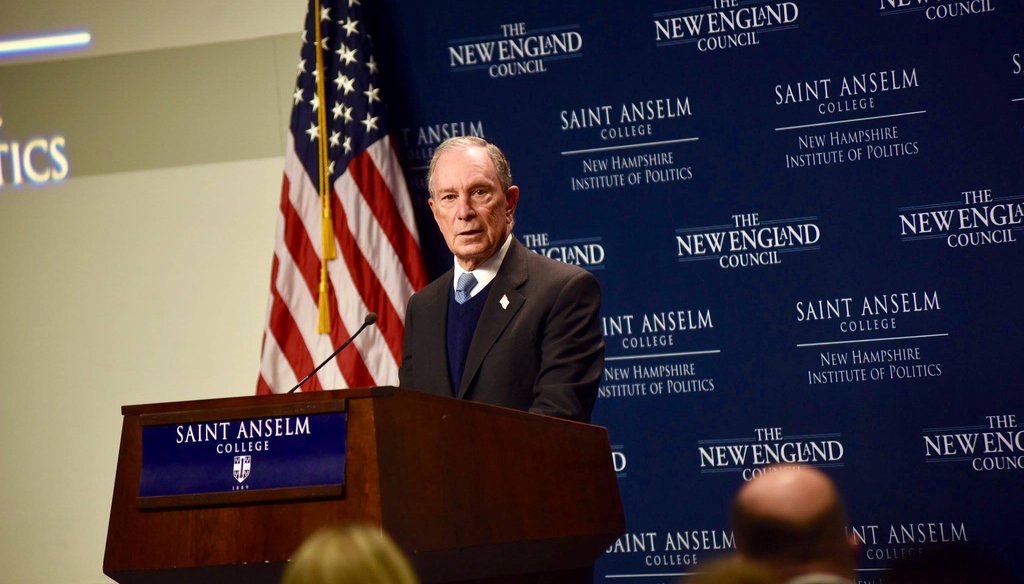Stand up for the facts!
Our only agenda is to publish the truth so you can be an informed participant in democracy.
We need your help.
I would like to contribute

Michael Bloomberg delivered a speech at the New Hampshire Institute of Politics on Jan. 29, 2019. (Courtesy Mike Bloomberg/Facebook)
If Your Time is short
- Michael Bloomberg’s history of jumping party lines has some Democrats wondering whether he’s really one of them.
- An independent since 2007, he has supported candidates of both parties in recent elections, and re-registered as a Democrat only in 2018.
- Bloomberg explained his record in a 2018 op-ed by saying he believes politicians should put country before party.
Michael Bloomberg is a leading contender for the 2020 Democratic presidential nomination despite being first elected mayor of New York as a Republican, and later switching his party affiliation to independent.
Indeed, he announced his re-registration as a Democrat only in October 2018.
That history and the billionaire businessman’s penchant for donating to Republicans has led to consternation among some Democrats who wonder whether Bloomberg is really one of them.
So is he?
"He’s never been as good a Democrat as Ronald Reagan was a Republican," Jim Frasier, former member of the Executive Committee of the Democratic National Committee, told PolitiFact. "He’s every bit as good a Democrat as Bernie Sanders is."
In 1980, Reagan was elected president as a Republican, after having spent much of his early political life as a Democrat. In 2016, Sanders was runner-up for the Democratic presidential nomination, though he hasn’t always identified as a member of the party.
Bloomberg’s campaign didn’t offer comment for this article. But in a June 2018 column, Bloomberg explained why he was supporting Democrats in their attempts to win control of the U.S. House of Representatives that year.
"I’ve never much liked political parties," Bloomberg wrote. "I’ve always believed that we should put country before party. Too many politicians practice the reverse, with terrible consequences for the American people."
Bloomberg, who turned 78 on Feb. 14, said in announcing his re-registration that he has been a Democrat most of his life. But he moved to the GOP in 2001, when he ran to succeed Republican Rudy Giuliani as New York’s mayor, the first of his three successful campaigns. About midway into his 12-year tenure, in 2007, he became an independent.
Bloomberg’s form of bipartisanship, seen by some as a pattern of contradictions, can be confusing:
-
On one day in 2010, Bloomberg gave speeches for Washington, D.C.’s Democratic mayor and a Democrat running for U.S. Senate in Pennsylvania — and held a fundraiser for a Republican running for U.S. Senate in Delaware.
-
In 2016, he spoke for presidential nominee Hillary Clinton at the Democratic National Convention — but also spent millions to help re-elect U.S. Sen. Pat Toomey, a Pennsylvania Republican.
-
In 2018, he wrote the op-ed announcing he was supporting a Democratic takeover of the U.S. House. Eight days later he held a fundraiser for a Republican House member, Peter King of New York.
Bloomberg will have to answer questions about his GOP past and about supporting positions not backed by most Democrats, said U.S. Rep. Mark Pocan, a Democrat in the swing state of Wisconsin and co-chair of the Congressional Progressive Caucus.
Bloomberg addressed one such issue a week before announcing his bid, apologizing for his support as mayor of the New York Police Department’s stop-and-frisk policy. It led to the disproportionate detentions of black and Latino people across the city.
But despite such questions, Pocan, who is supporting Sanders, is open to unconventional Democrats.
"I never try to exclude anyone," Pocan said in an interview. "If they say they’re a Democrat, they can show it with their values. And that’s what primaries are for, for voters to make that determination.
"You can call yourself a member of the Hello Kitty party, right? You can say whatever affiliation you see yourself as," he added. "But at the end of the day, if you talk about universal health care, you talk about college affordability, you talk about climate change, then you’re talking about issues that Democrats care about, and that’s what’s going to make people vote for you."
(On health care, Bloomberg backs building on Obamacare. He touts his proposals to help low-income students go to college. And he calls climate change "the greatest threat of our time.")
"The man is eminently qualified, certainly by today’s standards, to be president of the United States," said Frasier, the former DNC member and a Tulsa lawyer who is supporting Biden. "I’m not offended by [Bloomberg’s party switch] at all. It just raises my eyebrow of suspicion."
On one stance, Frasier has no quibbles: Bloomberg’s pledge to pay for nearly 500 staffers on his presidential campaign to continue working through November to support whoever wins the nomination.
"That is one hell of a promise," he said, "and it makes my old jaws water."
Editor's note: This article was corrected on March 2, 2020, to show that Bloomberg re-registered as a Democrat in 2018, not 2019.
Our Sources
PolitiFact, "Who is Michael Bloomberg? A bio of the Democratic presidential candidate," Dec. 3, 2019
New York Times, "After Hints of a Presidential Run, Bloomberg Switches to Democrat," Oct. 10, 2018
Politico, "'The hubris is unbelievable': Dems seethe over Bloomberg GOP donations," Nov. 26, 2019
NPR, "Bloomberg Busy Backing Candidates Of Both Parties," Aug. 18, 2010
Bloomberg.com, "Michael Bloomberg: Why I’m Supporting Democrats in 2018," June 20, 2018
Interview, Jim Frasier, Feb. 11, 2020
Interview, Mark Pocan, Feb. 14, 2020


























